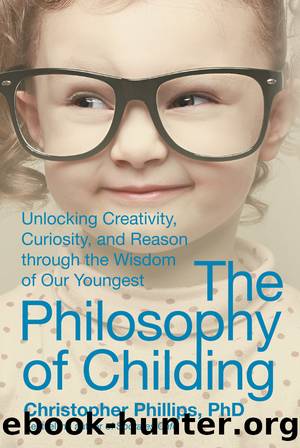The Philosophy of Childing by Christopher Phillips

Author:Christopher Phillips
Language: eng
Format: epub
Publisher: Skyhorse
Published: 2016-01-15T00:00:00+00:00
Right, Wrong, and Plastic Brains
The Harvard neuroscientist Joshua Greene has made it his forte to scan peopleâs brains while they consider moral dilemmas. In Moral Tribes, he shares his findings that when we agonize over matters of right and wrong, our brainsâ âstandard-issue moral machineryâ equips us with âautomated behavioral programs that motivate and stabilize cooperation within personal relationships and groups. These include capacities for empathy, vengefulness, honor, guilt, embarrassment, tribalism, and righteous indignation.â On the other hand, our so-called moral brains fail us when âourâ group is vying against other ones. In such instances, our better angels are âthwarted by tribalism ⦠, disagreement over the proper terms of cooperation, ⦠a biased sense of fairness, and a biased perception of facts.â Greene believes our ability to reason morally boils down to how well we wage the struggle between our atavistic gut instinctsâwhich drive us toward more combative and selfish behaviorâand our more advanced rational capacities that enable and inspire us to bridge differences. He concludes that our tendency toward tribalism is driven by older parts of our brain, while our will to cooperate and empathize stems from our more recently evolved neocortex. Greene maintains that we can override our more destructive impulses because our brains endow us with âa general capacity for conscious, explicit, practical reasoning that makes human decision flexible.â
If this is so, who is by far the most flexible among us in this regard?
An array of studies makes clear that adolescents have unrivaled brain plasticity, and that when this is properly tapped into, it allows them to learn and adapt far more quickly and adeptly than adults.12 What if we older folks exploited this capacity of theirs? To do so, weâd have to see this highly transitional stage as a window of opportunity. We might learn how best to evolve this capacity for conscious, explicit, practical reasoning, so that it stays with us and progresses over time. The problem is that those of us in the best position to realize this happen to be those with the least plasticity. Weâre not inclined to reach out to adolescents, no matter how much insight we might gain about how to remain more malleable, adaptive, and responsive to rapid changes.
Neuroscience didnât exist as a field in John Keatsâs day, but the early nineteenthâcentury romantic poet (1795â1821) offered a prescient paean to plasticity with his coinage ânegative capability,â which denotes our capacity to transcend preconceived limitations, and hence rewrite the story of our lives. To Keats, the most standout thinkers and doers demonstrate negative capability to an unsurpassed degree. They are at home with a world of âuncertainties, mysteries, doubts, without any irritable reaching after fact and reason.â Exemplars of negative capability (he considers Shakespeare the foremost among them) embrace paradox, dissonance, ambiguity, the unpredictable, and the unknown, and unhesitatingly venture into existential terrain where others fear to tread. Itâs not that fact and reason donât have a place in their seeking. Rather, itâs not the be-all and end-all. Sense and imagination also are equal partners.
Download
This site does not store any files on its server. We only index and link to content provided by other sites. Please contact the content providers to delete copyright contents if any and email us, we'll remove relevant links or contents immediately.
Cecilia; Or, Memoirs of an Heiress — Volume 1 by Fanny Burney(32538)
Cecilia; Or, Memoirs of an Heiress — Volume 2 by Fanny Burney(31935)
Cecilia; Or, Memoirs of an Heiress — Volume 3 by Fanny Burney(31925)
The Great Music City by Andrea Baker(31911)
We're Going to Need More Wine by Gabrielle Union(19032)
All the Missing Girls by Megan Miranda(15925)
Pimp by Iceberg Slim(14476)
Bombshells: Glamour Girls of a Lifetime by Sullivan Steve(14046)
For the Love of Europe by Rick Steves(13865)
Talking to Strangers by Malcolm Gladwell(13341)
Norse Mythology by Gaiman Neil(13332)
Fifty Shades Freed by E L James(13228)
Mindhunter: Inside the FBI's Elite Serial Crime Unit by John E. Douglas & Mark Olshaker(9313)
Crazy Rich Asians by Kevin Kwan(9271)
The Lost Art of Listening by Michael P. Nichols(7486)
Enlightenment Now: The Case for Reason, Science, Humanism, and Progress by Steven Pinker(7303)
The Four Agreements by Don Miguel Ruiz(6739)
Bad Blood by John Carreyrou(6609)
Weapons of Math Destruction by Cathy O'Neil(6260)
